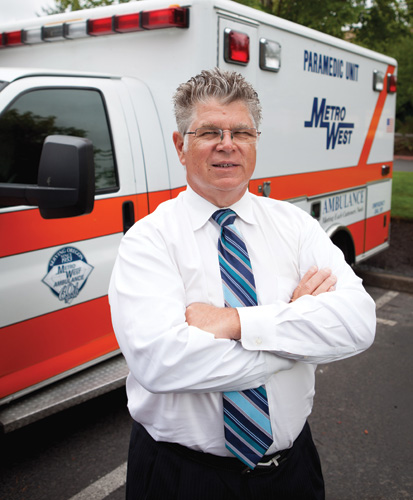 Metro West Ambulance, a Hillsboro-based, family-owned medical-transportation services company, celebrates its 60th anniversary this year. JD Fuiten, Metro West’s president, is also marking 35 years at the helm of the company his father started in Forest Grove in 1953.
Metro West Ambulance, a Hillsboro-based, family-owned medical-transportation services company, celebrates its 60th anniversary this year. JD Fuiten, Metro West’s president, is also marking 35 years at the helm of the company his father started in Forest Grove in 1953.
INTERVIEW BY LINDA BAKER
 |
JD Fuiten, president of Metro West Ambulance.// Photo by Adam Wickham |
Metro West Ambulance, a Hillsboro-based, family-owned medical-transportation services company, celebrates its 60th anniversary this year. JD Fuiten, Metro West’s president, is also marking 35 years at the helm of the company his father started in Forest Grove in 1953. Through Metro West and its three subsidiaries, the company responds to thousands of emergency and nonemergency requests for service each year in Washington County and the Oregon coast. The firm employs 500 and grossed about $40 million in 2012. In the Hillsboro headquarters, where dispatchers direct a fleet of 76 ambulances and nonemergency vehicles, Oregon Business spoke with Fuiten about new business development, heath care reform and how the obesity epidemic is driving innovation in the medical-transportation sector.
Back in the day. “In 1953 Washington County was a timber town, and Forest Grove and Hillsboro were vying for the largest city in the county. Forest Grove is where my dad got his start, and he eventually moved to Hillsboro. Since that time, our company has grown with the population base. I worked as an EMT before the EMT era. I drove an ambulance on my learner’s permit, when it was legal. An ambulance wasn’t recognized in the motor vehicle code at that time.”
Biggest Challenge. “Medicare reimbursement. It’s too low by the fed’s own admission, below our costs. Between 50% to 60% of our customers are Medicare age. According to the federal government, reimbursement is about 3% to 6% under cost, but being 50% of your business, it’s hard to make it up anywhere else. Our county contract says we have eight minutes, 30 seconds to be at 90% of the calls when they request. We’re in compliance every month.” Standby Service. “When you are at a Trail Blazers game, where does the service come from? It comes from a contract we have with the Rose Garden to cover all their events. We have three ambulances for every NBA game, one for the Winterhawks. There are four ambulances that follow Cycle Oregon.”
Partnerships. “The other thing we’ve been pretty successful at is developing contract relationships with hospital groups for interfacility transfer. We contract with Legacy and Providence. About a year ago we got the exclusive contract with Kaiser and really grew the company.”
Up and out. “It’s about meeting the needs of the customer. There was an article on the Internet saying we’ve now been surpassed as the most obese country on the planet: Mexico. We’re doing ‘bari adapters’ that were invented by one of the guys who works here. It’s a platform that you put on top of a power gurney that makes them wider for wider people. As people get more obese, they don’t get any taller.” Competitors. “AMR is basically our only competitor. They are a national chain. Kaiser had a national contract and then made the decision to break up their six regions and not go with the national contract, and contract with our company. So they gave the Northwest region to us. We serve Longview down to Salem.”
Next. “We hope to be one of the benefactors of Obamacare to cover the 10% of patients we see that don’t have insurance of any kind. Our contract with the counties is we have to respond to every call and take everyone to the hospital, regardless of the ability to pay. In the nonemergency business, we’re getting started in Clackamas County. We’re opening a starter facility to see what we can do with just vehicles and a mechanics shop. If we can make that concept work, then in a couple of years, we’ll be ready to put in a regular facility.”
Satisfaction. “Most people, EMTs and paramedics, are volunteers in this industry. The service demands aren’t that great. So I always want you to remember: Most people in the industry do it for free. We’re the lucky ones because we get paid to do it.”


